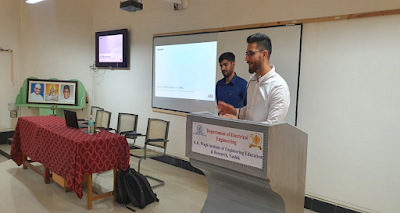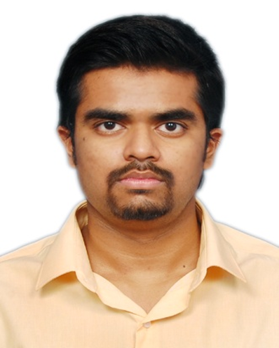From HoD’s Desk
Lots of physical activities and most importantly the in-semester examination was conducted in April. The in-semester examination was conducted strictly in the offline mode like conventional examinations conducted by the University. After a long period, students have written exam papers. To make students acquainted with the system a Mock In-semester examination was conducted. And, this helped students to write exam papers properly. This will enable students to appear in the final end-semester examination with full confidence.
Department Events
Expert Session on “Power Studies and Consulting" by Mr. Rahul Bhatt on 26 April 2022
Ideation Workshop cum Value-Added Course on “Understanding Academic Project Life Cycle” from 11th April 2022 to 16th April 2022
One Day training on ETAP by Mr. Manoj Mishra on 11 April 2022
Expert Session on “Instrument Transformer” by Mr. Manakchandra Gupta on 26 April 2022
Rangoli Competition on “World Earth Day”
On the
occasion of the “World Earth Day,”
Rangoli Competition was organized by the EFFECT student Body on the 22nd
of April 2022 Friday in Electrical Engineering Department. The theme was “Invest in Our Planet” for the Rangoli
competition. A criterion for the competition was Theme coverage, symmetry,
color combination, creativity, and neatness.
Prof. Preeti Vaidya and Prof. Monali Mahajan judged all Rangoli. Following are the winners
of the Rangoli competition.
1. First Prize: Sanika
Dighe and Yogini Jadhav (FE Computer Science and Design)
2. Second Prize: Chavanke
Gauri and Ohol Gayatri (SE Electrical Engineering)
3. Third Prize: Snehal Salunkhe and Sakshi Patil (FE Computer Engineering)
This event was coordinated by Prof. Nayana Jangle along with the student
committee of the EFFECT Student Body.
Parents Meeting
Department of Electrical
Engineering has organized an Online Parents Meeting on 1st April
2022 for all the parents of SE to BE students. Around 35 parents participated in
this meeting. During this meeting, Dr. Munje informed all the parents
about the exam pattern and preparation by the department for the coverage of
the remaining curriculum. Prof. Shewale gave information on the schedule
of practical and oral examinations and Prof. Dhamal informed parents
about the internship and project activities. The overall event was coordinated
by Prof. S. S. Khairnar and Prof. J. P. Shah.
Visit of Dr. B. N. Chaudhari, Principal, SPIT, Mumbai
Student Corner
Student Placement
|
Sr. No. |
Name of the
Student |
Placement Date |
Package LPA |
Batch |
|
1 |
Patil Ritesh
Mohan |
01/04/2022 |
4.5 Lacs |
2021-22 |
|
2 |
Sonawane Saurabh Baban |
01/04/2022 |
4.5 Lacs |
2021-22 |
|
3 |
Nilakshi Chandratre |
04/25/2022 |
3.5 lacs |
2021-22 |
|
4 |
Tejal Balkrushna Hadpe |
04/25/2022 |
3.5 lacs |
2021-22 |
|
5 |
Sarode Manish
Chandrakant |
01/04/2022 |
4.8 Lacs |
2021-22 |
|
6 |
Gaurav
LaxmanSawkare |
29/04/2022 |
3 Lacs |
2021-22 |
|
7 |
Mahesh Ghule |
29/04/2022 |
3 Lacs |
2021-22 |
BE Result
Industrial Visits
Student Participation in Connecting Dots
Connecting the Dots was an event
organized by the Central Office of the K. K. Wagh Education Society. In this,
all the engineering departments were requested to present their working
projects at the main entrance of the engineering institute. This event was inaugurated
at the hands of Hon. Mr. Shriram, MD of Ended Houser and chairman of CII
Maharashtra state council on 29th April 2022. Students from BE Electrical
1. Saurabh Baban Sonawane
2. Divya Manohar Chaudhari
3. Shubham Rajesh Rasane
Have demonstrated their project on ‘Super Capacitor-based
Electric Vehicle System’. Their project is well appreciated by the Hon. Shri.
Shriram. This project is guided by Prof. Sudhir Shinde. This event was coordinated by Prof. Shinde and
Prof. Narendra Rao.
Students Internship (Collaboration of ABB and University Young Talent)
The students from
the Electrical Department Ms. Sharvari
Phase (BE, Department of Electrical Engineering), along with Soheil Ansari
(Department of Mechanical Engineering), Ritesh Borse (Department of I.T Engineering),
Sairaj Dixit (Department of Computer Engineering) got an opportunity for three
months to work on ABB Digitization project at ABB Nashik. The collaboration of
ABB and University Young Talent was a great initiative taken by ABB for the
students to get industrial exposure and present their own perspectives on
industrial problems.
Faculty Corner
Faculty Participation
Industrial Training/Courses done by staff during April 2022.
1. Dr. R. K. Munje and Dr. S. S. Dhamal visited Advent Engineers, Manufacture of CTs, PTs, Metering Cubicles, and Distribution Transformers on 6th April 2022 and interacted with Shri. Manish Mishra and Ms. Premlata Mishra.
2. All the faculty members of the department have attended the sessions by Prof. N. J. Rao, Retired Professor, Indian Institute of Sciences, Bangalore organized on various topics such as Outcome-Based Education and Curriculum Development, etc. on 6th April 2022, 13th April 2022, 26th April 2022
3. Dr. Munje
and Prof. Shaha attended the meeting
of the Institution of Engineering and Technology (IET) in Bangalore on 30th
April 2022. Prof. Shah attended a
meeting of the Young Professionals Communities Committee (YPCC) and Dr. Munje attended a meeting of the
Communities Committee of South Asia (CCSA).
4. Dr. Munje received a certificate of ‘Academic Affiliate’ of IET of K. K. Wagh Institute of Engineering Education and Research during the visit to Bangalore on 30th April 2022 with the hands of Ms. Neha Singh, Senior Customer Engagement Manager, IET India
6. Prof. Pooja Sagar Sapkade has completed a one-week Faculty Development Program on Emerging Technologies organized by the Department of Information Technology, Dr. B.C. Roy Engineering College Durgapur, West Bengal
Alumni interaction
Student Articles
Connected Vehicles: The future of mobility
Connected Vehicles (CV), sometimes also referred to as Intelligent Connected Vehicles (ICV) are a newly emerging technology in the mobility domain that has the potential to revolutionize the whole vehicle ecosystem in terms of safety, security, comfort, and energy efficiency. Connected Vehicle mainly has two types of communication i.e. Vehicle-to-Vehicle (V2V) and Vehicle-to-Infrastructure (V2I). This article outlines various aspects of the connected vehicle concept and how it will affect our transportation system and urban environment shortly.
A connected car can be defined as “the presence of devices in an automobile that connects devices within the car/vehicles together or with devices, networks and services outside the car including other cars, home, office or infrastructure”. As discussed earlier CVs comprise mainly V2V and V2I communication. V2V communication means a wireless network where automobiles send information to each other about what they are doing. This data includes speed, location, the direction of travel, braking, and loss of stability and the range is up to 300 meters in 10 seconds at highway speeds. V2I communication consists of wireless communication between traffic signals and other stationary devices. In the early 2000s, the U.S. Department of Transportation (DOT) developed the Vehicle-Infrastructure Integration (VII) Program as a part of its Intelligent Transportation System (ITS) Program.
The main goal of VII was the development of wireless V2V and V2I communication to significantly improve safety and mobility on the nation’s roadways (ITS Joint Program Office RITA, 2010). To achieve this goal, the U.S. DOT proposed the use of dedicated short-range communications (DSRC) for V2V and V2I communications. DSRC works by using one-way or two-way short- to medium-range wireless communication radio channels tuned to the 5.9 GHz frequency (AASHTO, 2011). The main objective of connected vehicle technology is crash avoidance which potentially warns drivers from dangerous situations which may lead to a crash in which drivers will be able to see, hear, and even feel hazard signals through the vibration of the seat and moreover, in case of intelligent vehicles, a car can also apply brakes by itself in a hazardous situation. CV technology will also impact the design of highways, the capacity of roads and traffic operations, highway safety, and the environment. There are issues with CV technology like the privacy of the owner when it comes to sharing critical information with other vehicles and infrastructure, and security issues like the ability of a hacker to capture the data and alter the records which must be addressed before deployment of the technology, cost of the vehicle may increase due to implementation of these advanced technologies. There are some challenges in the deployment and application of CV technology like the difference in life cycles of the automotive and mobile industry i.e. new features, and operating system upgrades are provided almost constantly for smartphones, whereas car manufacturers work on five-year cycles, and objectives of mobile and automotive industries are different and they need to find ways to collaborate to satisfy customer connectivity needs and one more major challenge is tech-savviness of car dealers and salesperson, a salesperson need to spend an hour or two to teach the customer how to use this advance technology.
In conclusion, CV technology has the potential to reduce accidents on the road and improve the safety of drivers, it could stabilize traffic flows during congestion periods, reduce delays at signals, etc. If used with proper planning it could also positively impact our environment. CV technology has some issues and challenges which need to be addressed before deployment of the technology to achieve maximum benefit of this technology.Wireless Power Transfer using Inductive Power Transfer
About Newsletter
Declaration
Newsletter Committee
Chief
Editor: Dr. Ravindra K. Munje, Professor and I/C
HoD, Electrical Department
Faculty
Editors:
Prof.Saravanan. S, Assistant Professor
Prof.Priya Vyavahare, Assistant
Professor
Student
Editors: Anuj
Paul (BE-A)
VedikaDharaskar
(BE-A)
Sharvari Phase
(BE-A)
Abhishek Jadhav
(BE-A)
RutujaKapile (BE-A)
VaibhavDhanokar
(TE-A)
HuzaifSayyed (TE-A)
Please follow us on
Facebook: https://www.facebook.com/electrical.engg.kkwagh/
Blog:https://electricalkkwieer.blogspot.com/
YouTube: https://www.youtube.com/channel/UC08p5pixINTipmb2qv2IDkQ
Telegram: https://t.me/eekkwiee
(Newsletter
invites technical articles by students on engg-hod-elct@kkwagh.edu.in)



































